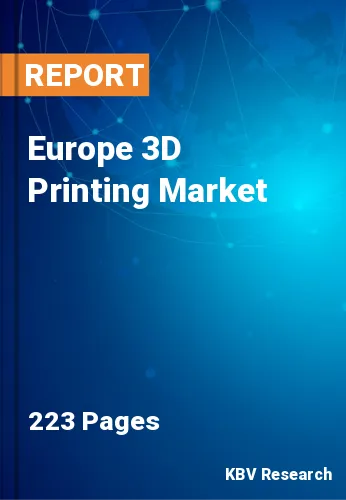The Europe 3D Printing Market would witness market growth of 20.9% CAGR during the forecast period (2023-2030).
Prototyping and tooling are the two most prevalent manufacturing uses for 3DP. Before progressing past prototyping, designers, and architects iterate quickly to perfect their designs. Making spare parts when needed, instead of producing and stocking them in advance, is an emerging application. Therefore, 3DP is a supplement to conventional production.
The benefits of 3DP are manifold and extend beyond customization and intricate designs. It can reduce material wastage significantly, making it an environmentally sustainable option. Additionally, it can save costs, especially in industries where tooling and mold production traditionally incur high expenses. This technology also makes rapid iteration and prototyping much easier, which enables businesses to bring their products to market more expediently and cost-effectively.
The medical field, in particular, has witnessed groundbreaking advancements owing to 3D printing. It has opened doors to unprecedented possibilities in the realm of healthcare. Surgeons can now practice intricate procedures on 3D-printed anatomical models before performing surgeries on patients. Researchers are even exploring the potential for 3D bioprinting, a cutting-edge field that aims to produce functional human organs using living cells.
After Germany, Italy, and the UK, France holds the fourth-place spot in the regional AM industry. The French additive manufacturing industry generated an estimated $580 million in revenue in 2021. For the upcoming years, the French market is expected to rise by an average of 7% annually. France is a developed market for 3D printers, on-demand manufacturing services, materials & consumables, file storage, post-processing activities, and 3D software. These developments and the technology's versatility and relevance to various industrial needs position Europe as a prominent region.
The Germany market dominated the Europe 3D Printing Market By Country in 2022, and would continue to be a dominant market till 2030; thereby, achieving a market value of $5,679.2 million by 2030. The UK market is exhibiting a CAGR of 19.9% during (2023 - 2030). Additionally, The France market would experience a CAGR of 21.8% during (2023 - 2030).
Based on Component, the market is segmented into Product (Printer [Industrial and Desktop], Material [Polymer, Metal & Alloys, Ceramic and Others]), Software (Design Software, Inspection Software, Printer Software and Scanning Software), Services. Based on Technology, the market is segmented into Stereolithography, Fused Deposition Modeling, Selective Laser Sintering, Laminated object Manufacturing, Electron Beam Melting and Others. Based on Application, the market is segmented into Functional Parts, Fit & Assembly, Prototype Tooling, Metal Casting, Visual Aids, Presentation Modeling, Education/Research and Others. Based on Vertical, the market is segmented into Consumer Goods, Construction, Education, Industrial, Healthcare, Aerospace & Defense, Automotive and Others. Based on countries, the market is segmented into Germany, UK, France, Russia, Spain, Italy, and Rest of Europe.
Free Valuable Insights: The Global 3D Printing Market will Hit $86.4 Billion by 2030, at a CAGR of 21.4%
The market research report covers the analysis of key stakeholders of the market. Key companies profiled in the report include Hoganas AB, 3D Systems Corporation, Materialise NV, General Electric Company, Stratasys Ltd., Autodesk, Inc., The ExOne company (Desktop Metal, Inc.), Organovo Holdings, Inc., voxeljet AG and Canon, Inc.
By Component
By Technology
By Application
By Vertical
Our team of dedicated experts can provide you with attractive expansion opportunities for your business.

